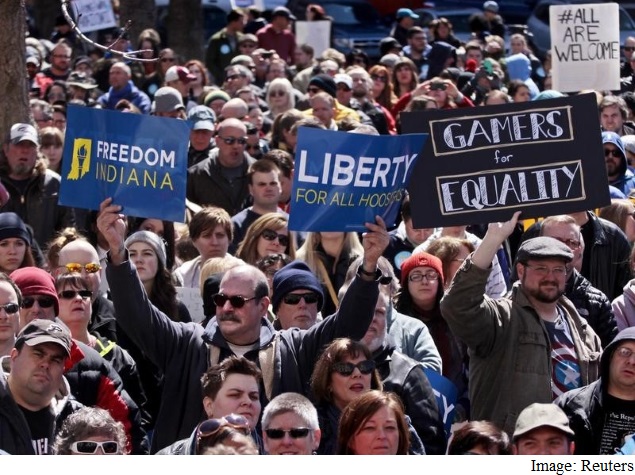- Home
- Others
- Others News
- Tech Leaders Call for Anti Discrimination Laws to Protect Gays in All 50 States
Tech Leaders Call for Anti-Discrimination Laws to Protect Gays in All 50 States

More than three dozen chief executives and other senior Silicon Valley leaders issued a joint statement on Wednesday, asking state legislatures to add sexual orientation and gender identity as protected classes to their civil rights laws.
Max Levchin, a co-founder of PayPal and the chief executive of Affirm, a payments startup, organized the statement, which was signed by the chief executives of Twitter, Airbnb, Lyft, Evernote, Salesforce.com, Yelp and other companies.
The statement follows a firestorm over a new Indiana law signed last week by the state's Republican governor, Mike Pence, that supporters said would protect religious freedoms in the state. An array of critics from business, entertainment, sports and politics have criticized the law as a thinly veiled attempt to let businesses deny service to gays, including to same-sex couples seeking to marry.
Following the outcry, Pence has said he plans to modify the law. Arkansas passed its own religious freedom law on Tuesday, and at least a dozen states are considering similar measures that could allow businesses to refuse service to gays, critics say.
The specter of additional state laws is part of what pushed technology executives to ask legislatures to change their civil rights laws.
"Religious freedom, inclusion and diversity can coexist and everyone, including LGBT people and people of faith, should be protected under their states' civil rights laws," their statement reads. "No person should have to fear losing their job, or be denied service or housing because of who they are or whom they love."
A number of states already have such laws in place for different aspects of public life. According to the Human Rights Campaign, a gay rights organization, 17 states and the District of Columbia have laws that prohibit discrimination in restaurants, shops and other public accommodations on the basis of sexual orientation and gender identity. An additional four, including New Hampshire, New York and Massachusetts, have similar laws banning discrimination based only on sexual orientation.
Laws in those and other states also prohibit discrimination against gays in education and employment.
For the states like Indiana and Arkansas that are enacting religious freedom laws, Levchin said the group is asking legislatures "to explicitly state that the law does not provide persons or businesses the right to refuse service to anyone, including LGBT people."
In a phone interview, Fred Sainz, a spokesman for the Human Rights Campaign, said that "nondiscrimination statues unfortunately do not exist in the vast majority of states across our country."
With their statement, Sainz said technology leaders are sending a message that "if we're seriously engaging in a conversation about civil rights, then let's also engage in a conversation about nondiscrimination protection for LGBT people."
© 2015 New York Times News Service
Catch the latest from the Consumer Electronics Show on Gadgets 360, at our CES 2026 hub.
Related Stories
- Samsung Galaxy Unpacked 2025
- ChatGPT
- Redmi Note 14 Pro+
- iPhone 16
- Apple Vision Pro
- Oneplus 12
- OnePlus Nord CE 3 Lite 5G
- iPhone 13
- Xiaomi 14 Pro
- Oppo Find N3
- Tecno Spark Go (2023)
- Realme V30
- Best Phones Under 25000
- Samsung Galaxy S24 Series
- Cryptocurrency
- iQoo 12
- Samsung Galaxy S24 Ultra
- Giottus
- Samsung Galaxy Z Flip 5
- Apple 'Scary Fast'
- Housefull 5
- GoPro Hero 12 Black Review
- Invincible Season 2
- JioGlass
- HD Ready TV
- Laptop Under 50000
- Smartwatch Under 10000
- Latest Mobile Phones
- Compare Phones
- Samsung Galaxy A07 5G
- Vivo Y500i
- OnePlus Turbo 6V
- OnePlus Turbo 6
- Itel Zeno 20 Max
- OPPO Reno 15 Pro Mini 5G
- Poco M8 Pro 5G
- Motorola Signature
- Lenovo Yoga Slim 7x (2025)
- Lenovo Yoga Slim 7a
- Realme Pad 3
- OPPO Pad Air 5
- NoiseFit Pro 6R
- Xiaomi Watch 5
- Acerpure Nitro Z Series 100-inch QLED TV
- Samsung 43 Inch LED Ultra HD (4K) Smart TV (UA43UE81AFULXL)
- Asus ROG Ally
- Nintendo Switch Lite
- Haier 1.6 Ton 5 Star Inverter Split AC (HSU19G-MZAID5BN-INV)
- Haier 1.6 Ton 5 Star Inverter Split AC (HSU19G-MZAIM5BN-INV)

















